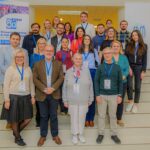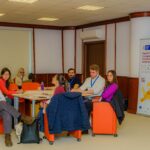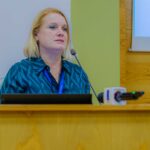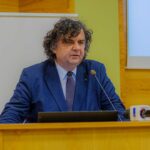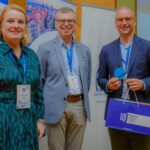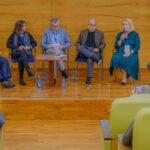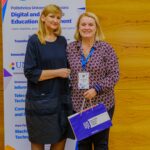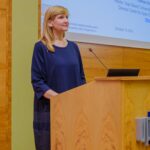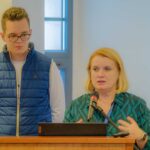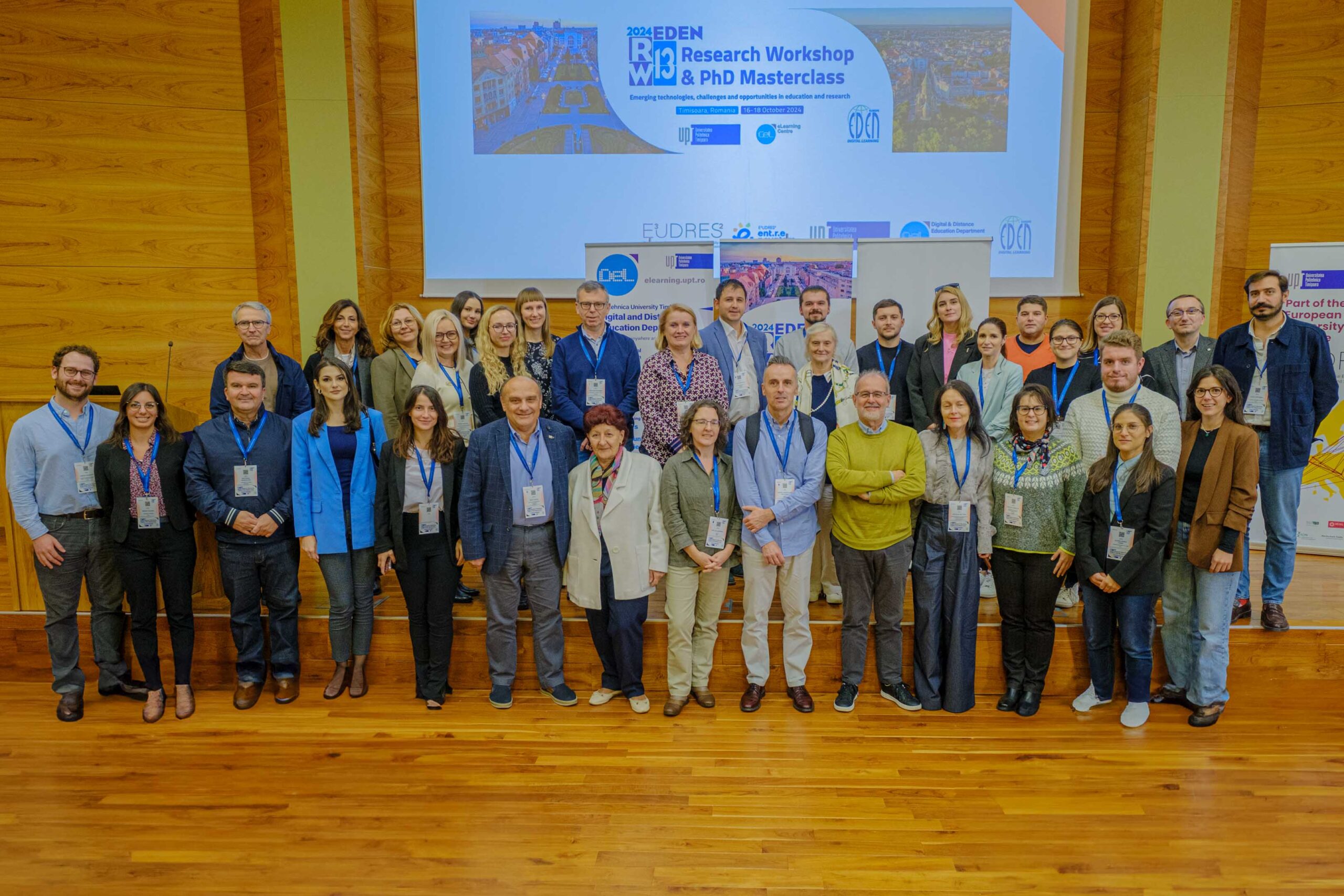
EDEN 2024 Research Workshop & PhD Schools' Masterclass: Dozens of papers, hundreds of participants from 15 countries
The Department of ID/IFR and Digital Education UPT, together with the European Distance and e-Learning Network EDEN organized, between October 16-18, 2024, the Conference EDEN 2024 Research Workshop & PhD Schools' Masterclass in Timisoara.
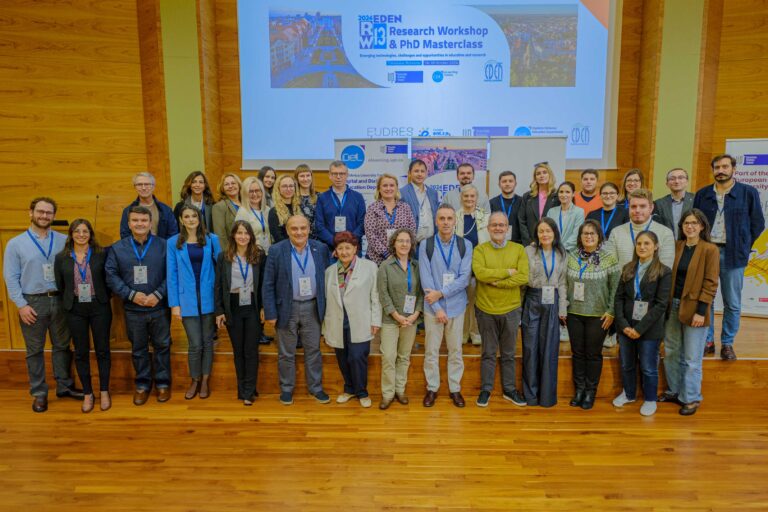
The event brought together more than 70 researchers from 15 countries, presenting a series of more than 50 scientific papers on emerging technologies, as well as opportunities in education and research. The plenary sessions, open to the general public, gathered over 300 participants, both in the Auditorium of the UPT Conference Center and online, via Zoom and Facebook.
Keynote guests included Professor Teemu Roos, the main creator of the online course Elements of AI, with over 1.4 million users, classified as the best online MOOC computer science course in the world, but also prof. Carmen Holotescu, world-class expert in blockchain implementation in education.
PhD Schools' Masterclass
The first day of the event kicked off with a Masterclass session attended by dozens of PhD students from 5 countries, witnessing exciting physical and online presentations and discussions and mentoring on topics such as research methods for PhD students, the use and influence of intelligence artificial in research, as well as the relationship between doctoral students and their coordinators.
Keynote Teemu Roos, on Technology Education for the AI Generation
The opening plenary session of the conference took place on Thursday, October 17 and brought together over 150 participants, both in the Auditorium and online via Zoom and Facebook. At the opening of the event, the rector of UPT, conf. university Dr. Florin Dragan, dr. Joseph M. Duart, president of the EDEN organization in the period 2021-2024 and dr. Diana Andone, the director of DeL UPT, in a session chaired by Wim Van Petegem, KU Leuven and President of the European Distance and e-Learning Network EDEN.
One of the most anticipated moments of the event was the presentation of the guest keynote, Professor Teemu Roos, University of Helsinki, the main creator of the online course Elements of AI, with over 1.4 million users, ranked as the world's best online computer science MOOC course, which gave a presentation on using and understanding how artificial intelligence works, as well as the resources available to educate the general public in using and AI capabilities. After the presentation, Roos answered a series of questions from the audience, both in the room and online, in a Q&A session.
Panel discussion with leading experts
A plenary session that gathered over 100 participants, online and physically, was the "Emerging Best Practices in Research Methods" Discussion Panel, a session in which prof. Wim Van Petegem, Dr. Eng. Diana Andone, conf. Dr. Eng. Silviu Vert, conf. Antonella Poce, prof. Albert Sangra Morer they exchanged ideas and examples of practices in research methods from their own experience, in a discussion moderated by prof. Dr. Eng. Radu Vasiu.
Prof. Carmen Holotescu, about blockchain in education
Friday's Keynote guest, prof. Carmen Holotescu - rector at "Ioan Slavici" University Timișoara shared his vast experience in the field open education and of blockchain technologies. His presentation highlighted the evolution of digital technologies in Romania, illustrating how blockchain can reshape educational frameworks, offering examples of projects and practices from UPT's involvement in the implementation of these technologies.
10 scientific papers published by the DeL team
The conference collected 79 papers, of which 47 final papers, written around the theme "Emerging technologies, challenges and opportunities in education and research”, of which a number of 10 scientific papers have been published by ID/IFR and e-Learning Department team members and collaborators, as follows: From Digital Distraction to Digital Engagement: Leveraging Microlearning and Gamification for E-Learning Effectiveness – Sorina Voina, Diana Andone, Radu Vasiu, Generative artificial intelligence and student creativity: Challenges, opportunities and critical commitment – Diana Andone, Vlad Mihăescu; An EBSI-based initiative to promote the self-sovereign identity paradigm in the education and social security sectors – Andrei Ternauciuc, Radu Vasiu, Diana Andone, Victor Holotescu, Carmen Holotescu; Building a Decentralized Educational Ecosystem: Blockchain Pioneering Initiatives of the Polytechnic University of Timișoara – Victor Holotescu, Radu Vasiu, Carmen Holotescu, Diana Andone, Andrei Ternauciuc; Limitations of open-source in e-Learning – Andrei Ternauciuc, Diana Andone; Scenarios for digital credentials for Europe (EBSI-DC4EU) – the Romanian contribution – Diana Andone, Carmen Holotescu, Andrei Ternauciuc, Victor Holotescu, Radu Vasiu; Accelerating the entrepreneurial aspects of digital education – Diana Andone, Maria Elena Boatca, Rimante Rusaite, Radu Vasiu; Facilitating open principles: tools for European university alliances – case study E3UDRES2 – Diana Andone, Vlad Mihaescu, Andrei Ternauciuc, Muguras Mocofan, Ann Reulens, Maria Catarina Paz; Contributions of Politehnica Timișoara University to the EBSI-NE Project – Radu Vasiu, Andrei Ternauciuc, Victor Holotescu, Carmen Holotescu, Diana Andone; Improving user experience for the Spotlight Heritage Timisoara web platform with AI technologies – Valentin Sorescu, Diana Andone
The best work
The selection process was supported by the UNESCO Chair in Education and Technology for Social Change at UOC, through the jury, approved by the Board of Directors of EDEN DLE. This year's jury members were: Christian-Andreas Schumann, (President of the jury), conf. Vlad Mihaescu (UPT) and Elsebeth Korsgaard Sorensen. After a first pre-selection, the six finalists were: Jacqueline Toal (Lancaster University, Dundalk Institute of Technology, Ireland) with the paper A Comparative Case Study: Generative AI for Enhancing Human Creativity in Learning: Exploring the Lived Experience of Part-Time Online Adult Animation Learners in Higher Education; Felipe Maciel Tessarolo, Chris Edwards, Duygu Bektik, Denise Whitelock (The Open University, Great Britain) with the paper Comparing the use and practical perceptions of GenAI in higher education with current published perspectives; Sorina Voina, Diana Andone, Radu Vasiu (Polytechnic University of Timisoara, Romania) with the paper Generative Artificial Intelligence and Student Creativity: Challenges, Opportunities and Critical Engagement; Diana Andone, Vlad Mihaescu (Universitatea Politehnica Timisoara, Romania) with the paper From digital distraction to digital engagement: leveraging microlearning and gamification for e-learning effectiveness; Janika Leoste Mart Laanpere, Voldemar Tomusk (University of Tallinn. Estonia); Slavko Rakic, Ugljesa Marjanovic (University of Novi Sad, Serbia) with the paper The Quadruple Helix in EdTech: A First-Year Study in Developing Countries, Daniel Dominguez, Inés Gil-Jaurena (Universidad Nacional de Educación a Distancia, UNED, Spain) with the paper Student adaptation to digital assessment in online learning and Prof. Estela Daukšienė, Giedrė Tamoliūnė, Airina Volungevičienė, Elena Trepulė (Vytautas Magnus University, Lithuania) with the paper Student perspectives on collaborative international courses leading to micro-credentials: The case of Digi.
After reviewing all the papers submitted to the Conference, the jury members voted unanimously to award the title of "Best Paper" to Daniel Dominguez and Inés Gil-Jaurena (Universidad Nacional de Educación a Distancia, UNED, Spain): "Student adaptation to digital assessment in online learning”.

13th Edition EDEN 2024 Research Workshop & PhD Schools' Masterclass took place in Timisoara aimed to provide a comprehensive exploration of the latest advances and challenges in educational technology, with a particular focus on the integration of artificial intelligence in education, European university alliances and their role in research and digital education, the emerging concept of micro education and microcredits, as well as the application of AR/VR technologies in the educational environment.
Recordings of plenary sessions are available:
